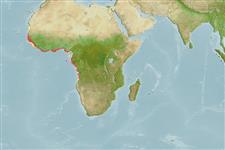Preferred temperature (Ref.
115969): 19.2 - 27.9, mean 25.7 (based on 88 cells).
Fylogenetische diversiteitsindex (Ref.
82804): PD
50 = 0.5000 [Uniqueness, from 0.5 = low to 2.0 = high].
Bayesian length-weight: a=0.00417 (0.00202 - 0.00858), b=3.08 (2.91 - 3.25), in cm Total Length, based on LWR estimates for this Genus-body shape (Ref.
93245).
Trofisch niveau (Ref.
69278): 3.6 ±0.58 se; based on food items.
Weerstandsvermogen (Ref.
120179): laag, minimale populatieverdubbelingstijd 4,5-14 jaar (K=0.10).
Fishing Vulnerability (Ref.
59153): High vulnerability (64 of 100).
